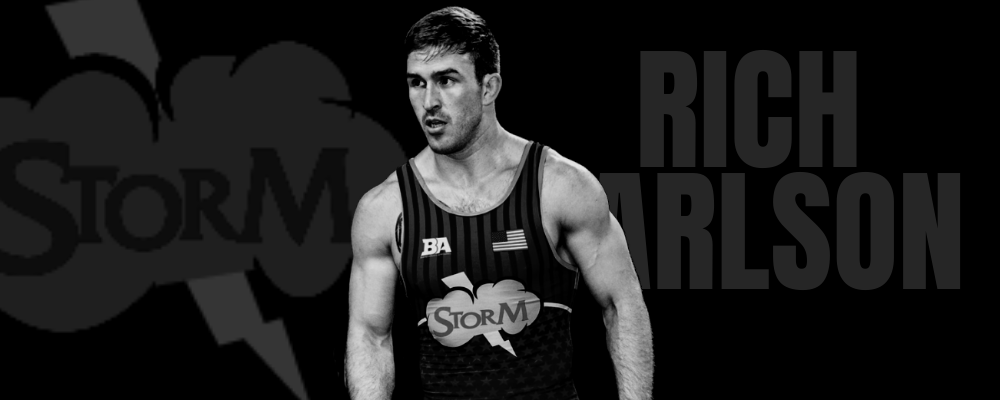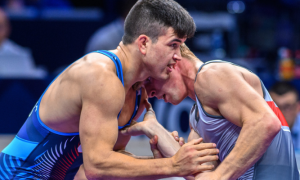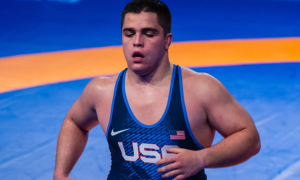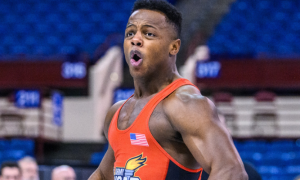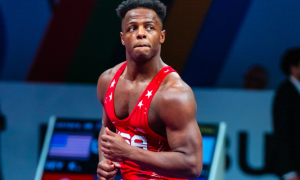One foot in front of the other. One step, as in “one step at a time”. Except, what if those steps do not observe a linear path? What happens when the footprints betray a winding, zig-zag pattern and it becomes difficult to tell where exactly the point of origin begins? You’d have to figure that at least once or twice those steps overlapped, for the treads of the soles are recessed just a little deeper in certain spots.
That’s how you can tell. It won’t matter, and more pressing items demand concern. The “where” and “how” eventually, and subsequently, fade from the conversation, because after a while all anyone cares about is the present. Those footprints, no, they are never forgotten. If anything, appreciation reigns upon the reflection of what they meant, and still could mean. It is just that in order to examine them, you have to turn your head. You have to look backwards.
And Rich Carlson (82 kg, Minnesota Storm) these days prefers to keep his eyes forward.
But there are lessons that Carlson, 27, has gleaned from walking a walk that — even for an American Greco-Roman athlete — is decidedly unconventional. It has shaped who he is and how he perceives his place in a sport that churns out neck-and-neck results as often as it does lopsided outcomes. Greco in the US, perpetually a hyper-competitive proposition in most weight categories, requires its top participants to do nothing other than lay down their lives for the sake of consistent improvement — and later, hopefully, World accolades. Outsiders view the pursuit as a presupposed straight line. For a select few, it just might be. For most, there are peaks and valleys intermittently spread out across what always is an imaginary rendering.
Carlson? Peaks and valleys? Maybe? You could say that, and if you did, no one would vehemently disagree. Perhaps not even Carlson himself. Except when on the receiving end of a more diligent inspection, Carlson’s hike to the top of United States Greco thus far is straighter than it often appears. There are and have been deviations and detours. But there has also been a constant: each time Carlson has competed, at the Senior level or otherwise, he has threatened. He has, in so many words, always been a factor.
Placement on the 2014 US Junior Greco-Roman World Team arrived in concert with the early stages of what later became a twice All-American-earning tenure at the University of Wisconsin-La Crosse. As a collegian, Carlson was an excellent competitor, to be sure, and continuing on post-degree was firmly in his plans. So, he did. He had a foot planted in the Greco scene, spent some time at the OTC (Olympic & Paralympic Training Center), plus there is the whole Minnesota bloodline thing. It made sense.
This is where squinting the eyes a little is a good idea, particularly for the uninitiated. Carlson’s primary ledger starting in ’17 reads like this:
— ’17 Senior World Team Trials — 5th
— ’17 U23 World Team Trials — 2nd
— ’18 US Open — 3rd
— ’18 Senior World Team Trials — 3rd (though is officially deemed 4th due to the convoluted “true 2nd” procedure.)
— ’19 US Nationals/Olympic Trials Qualifier — 4th
Missing from the above list is Carlson’s only washout, which occurred at the ’19 Bill Farrell Memorial. The event that year served as an Olympic Trials qualifier but — and regardless of how ridiculous this decision was — did not include wrestlebacks for wrestlers who did not advance to the quarterfinal round. Carlson had fallen into quicksand opposite Chandler Rogers in the round-of-16, that was that, and it wound up becoming a non-issue one month hence when Carlson placed fourth at the Nationals, thereby securing a berth in said Trials.
The question, then, for the quick-witted sort, would be: ‘How is a guy like this not talked about more?’
The answer: the five results listed above represent all of Carlson’s major Senior performances. There are no overseas boxscores or recaps, no less-than-marquee domestic event entrances. When Carlson has showed up, for the overwhelming most part, it has been for a big-time US of A tournament. While contemporaries have trained and trained, and competed and competed, Carlson has swooped in occasionally like an “aw shucks” version of John Wayne before proceeding to lay beatdown after beatdown.
But he is not oft discussed because he can’t be. It is hard, isn’t it? To wax poetic about a combatant who is so very clearly cut out for bigger and better things, relative Greco “stardom”, except that he hasn’t been around all that much, or not as much as the lion’s share of his domestic opposition?
Oh, there are reasons. And you’ll get ’em. One is that Carlson isn’t just a wrestler. As a member of the Minnesota National Guard, he is also a solider. He is also…an ultra-runner, or ultra-marathoner, or whatever you call folks who insist on exceeding 30 to 50 miles without the benefit of rubberized wheels. He was, or is, an MMA fighter, for that was a road he strongly considered several years ago, as well, and was victorious in what remains his only foray into that realm back in ’17.
Where it stands now is easy. Carlson was unable to enter in the ’20 Olympic Trials because he was deployed. When he returned to wrestling at the ’21 World Team Trials in September, it had been 21 months since he had last competed. That did little to disrupt the narrative. Carlson took a loss to two-time Olympian Ben Provisor (NYAC) in the semifinal and later finished third — which in any other year would have been good for National Team honors.
It is not that Carlson is so good that he can just pop in and do well without immense effort. On the contrary, a ton of effort and devotion are responsible for his viability. In fact, Carlson is so knockdown, drag-out in love with the process that he claims, “Pain and suffering are the secret recipe for success”. It is more that Carlson has always been a superb wrestler who wields the capability to accomplish the incredible; but again, only because his willingness to invest in misery trumps a normal human’s penchant towards complacency. He’s not normal, Rich Carlson.
Neither is the path he has chosen.
But isn’t that how all great stories start?
5PM Interview with Rich Carlson
5PM: You made the Junior World Team in 2014, which is both not that long ago and I guess a while ago. Backtracking, can you recall what that achievement meant to you?
Rich Carlson: It was a huge deal at that time. It meant the world to me and my entire wrestling career. Up until that point, I felt like I had never really won like a big tournament. I mean, I had done well and had success; but I had never won something like the Junior Nationals or the World Team Trials. So yeah, that was one of the best feelings and in the world.
I also think it really boosted my confidence as a wrestler because, going into that tournament, it was one of the first times that I really believed. I was like, I’m in this tournament and I think I am going to win it. To have that feeling and then actually do it showed me that I was capable of that. I think it really propelled me forward. I was a freshman in college going into my sophomore year. I didn’t qualify for the nationals the year prior, so entering the next season after having made a Junior World Team put a chip on my shoulder. It was, I’m here and I can do this. It really was a pivotal moment for me in my wrestling career.
5PM: Do you remember wondering or comparing what the differences in competition might be like between the Junior and Senior levels?
RC: It’s hard to say because at that point in time, I was still so focused on trying to win a DIII national title and that was my main focus. I always loved Greco and knew that I was going to continue wrestling Greco when I was done with college. I don’t know. I have had so many breaks from wrestling that it has been kind of a weird development for me to get a feel for what the Senior level is. I had transitioned from the Junior World Team and then it was, Okay, let’s go back to college wrestling, then I wrestled in the Senior Trials in ’17, which was my first real taste of the Senior level. I did okay. I wrestled (John) Stefanowicz in my first match and did alright on the feet but he sort of ate me up in par terre. I remember walking away from that thinking, Okay, this is a level up and it’s definitely tougher. That is when I realized I had to develop my par terre.
After that, I decided to enlist in the military because that was something I had wanted to do since before I graduated from high school. Then I was gone, for what? Eight or nine months for my initial training? And then I come back and wrestle, so it was kind of slow getting back to it. I placed third at the US Open in 2018, left for basic (training), came back, felt rusty, and then placed fourth at the US Open in ’19. Then COVID happened, I got deployed, took another year off, and came back.
It has been a weird perception of wrestling at the Senior level because it is like I’d get a taste of it before being pulled away; then another taste of it, and then pulled away again. But each time it has given me a fresh perspective, I would say. It has almost been a good thing because I would leave and come back while being able to develop a new perspective as to what worked, and what didn’t.
5PM: Has any of this been a huge source of frustration? How, with these stops and starts, have you managed to maintain a competitive mindset with gaps like these?
RC: I think a lot of it just comes down to being a resilient person and it takes a lot for me to get frustrated. Part of that just comes from the love of the sport. I’ll wrestle no matter what. I mean, it’s fun. There have been times where I thought I would step away from wrestling — like, for good. I don’t think I ever will completely, I’ll always be involved. But even when I’m not wrestling, like when I went to basic training. That is a competitive experience. When you’re going through that, you are pitted up against other people. You are being comparted to other people, you have to perform, you’re being evaluated… It is the same thing on deployment. The military is a competitive environment.
I think I always put myself in competitive environments. Even before my deployment, when the pandemic took off and wrestling came to stop. Well, I’ve always been running for training. I love running. I’ve run half-marathons and there was a 50-mile trail race that I did. That was when I came to a decision where I said, I’m going to train for 50-mile trail races. We’re not wrestling right now, so I’m going to do it.
So I think whether I have been pulled away from wrestling due to my own decisions or because of the military, or getting cut off from wrestling because of the pandemic, I have always been able to put myself in positions where I am doing something competitive and maintaining that mindset. And I think I don’t get frustrated because I love wrestling.
5PM: Do you ever look back at how some of this has played out and think to yourself, ‘If I never had a break here or there, by now I would have made a Senior Team’?
Rich Carlson: Oh, I don’t know. I mean, it’s easy to say with hindsight being 20/20 how, Maybe if I had set up this lifestyle so I was doing nothing but wrestling, doing two-a-day’s, and committed 100% to trying to make an Olympic Team… And with not having a day job and not being in the military, it would be easy to say, Oh, I would have done it. But, I don’t know. Maybe this way it’s better. It is a different path that over time has grown.
Especially thinking back to my collegiate career, I was never able to win a DIII national title, and it was the same thing in high school. My DIII career reflected my high school career almost exactly the same way. I was set up to be one of the top-3 guys in my state or in the country with a legitimate shot at winning that DIII national title, or that high school state title. And I came up short. Now with hindsight, I believe that it was all mental, and that I had never really gave myself time to be away from wrestling and to come back with a fresh perspective. That is not to say I’ve done this intentionally, but being away from wrestling gave me a lot of time to reflect.
Then to come back to wrestling after taking a year off? That’s not an easy thing to do. A lot of people, if they have a year-long injury, they don’t come back. Or if they have multiple injuries and take time off, they don’t come back. I don’t know if I can think of another guy who has taken that much time off and came back to the sport. Maybe Jake Fisher. He was gone for a while, came back, and then made the National finals. He is an example, but I don’t think there are a lot of guys who have done that. I think I can do it, and do it well. I also think that I’ve gotten to the point now where I have learned what I have needed to.
The other thing I want to say is that during 2020, I didn’t feel like I was totally committed to wrestling. There have been a lot of letdowns for me with wrestling. For example, I already brought up high school and the DIII nationals. I wanted some form of… What’s the word? I wanted some form of reconciliation before I could leave wrestling for good. Like, I had that MMA fight. I had gotten involved in that scene and part of me wanted jump into that and do it full-time. I was like, Maybe this is where I belong? But then it was, I’m going to commit to the 2020 Olympic cycle, I’m going to make the Olympic Trials, I am going to make the Olympic Team. I’m going to shoot my shot and then wipe my hands clean of wrestling and move on to MMA. In a perfect world, that’s what I was going to do. But then the pandemic happened. I did qualify for the Olympic Trials but didn’t get to shoot my shot. The Olympic Trials got postponed, the Olympics got postponed, I got deployed. The Trials happened in April and I did not even return to the country until late-April. Even when I came back, honestly, I am not entirely sure that I wanted to come back to wrestling. It sucks to have that happen, but it was, I never even got to wrestle in the Olympic Trials.
So I decided, Well, let’s go back to wrestling practice, but without expectations. Just to see how I would feel. I got back into the room and, in no time immediately, I was like, Yep, I’m back. I then made the decision to commit to the 2024 Olympic cycle and now there is nothing in the next two or three years that is going to pull me away from the sport. I am going to shoot my final shot here and commit 100%.
That is how it has happened, I guess. I don’t think that I have ever been as committed as I am now. It could almost be that that not getting to wrestle in the 2020 Olympic Trials has fueled the fire even more because, honestly, I’ve never been more committed. I have never lifted weights like I have been. That is one of the things I have critiqued myself on in the past if I had losses. Like I’d tell myself, If you took lifting more seriously you would have beat that guy. Or, even watching video. I would watch wrestling matches here and there previously, but not too seriously. Now I am finding myself talking to Coach (Dan) Chandler about certain techniques and he will say, Watch Garrett Lowney against the Russian from the 2000 Olympics, or, Go, watch this match, this technique… Then I will go home and watch it.
But I don’t think it is frustration. I don’t really look at my past and ask, What if? I think that is kind of pointless. I just look back on it and say, This is what happened, this is how the cards were played, and what am I going to do moving forward?
5PM: Coming back, say prior to the September Trials, were you cognizant that there might be some new guys in your weight class? Do you normally pay close attention to those in and around your weight, who might be in your bracket, and so forth?
RC: Honestly, I really don’t pay attention. I kind of just go into it with the mindset of, I’ve got to beat the guys in my weight, it doesn’t really matter who they are. I don’t care who they are. I think paying too much attention to your opponents doesn’t do you any good.
That being said, I do pay attention to my coaches if they say something like, This guy does this, this guy does that. For example, (Ben) Provisor. Obviously, I knew who he was going into the World Team Trials, but every other name in the bracket they seeded based off of… I have no idea what they based it off of. But going into my match with Provisor, Pat (Smith) told me, Hey, watch out for this on the feet. He’s going to do it. I then defended him (Provisor) on the feet pretty well, in my opinion. It was par terre where he got me, which is kind of funny because after the match Pat said, I wanted to tell you about par terre, too, but I didn’t want to overload you with too much info. So it’s kind of funny, because he gave me one piece of advice that I felt worked really well. I wondered if I got that second piece of advice if the match would have gone differently.
5PM: So in other words, you are blaming Pat Smith.
RC: (Laughs) No, no, it’s not Pat Smith’s fault. He gives me good advice and he’s a good teammate to have.
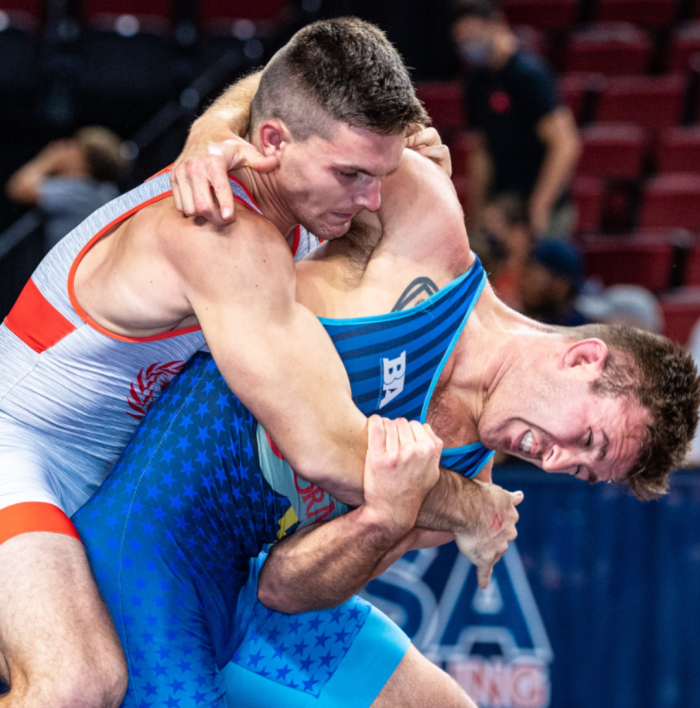
Carlson’s headlock, brandished here at the expense of John Hagey (505 WC) during the 2021 US World Team Trials, is a weapon the Minnesotan has used dating back to his days as a young Greco competitor. “I loved taking shots and shooting double-legs, and then when I did my first Greco tournament I pinned all my opponents with a headlock. From that moment forward, I was going upper-body. I was going to headlock everyone.” (Photo: Sam Janicki)
5PM: You are someone who doesn’t travel, hasn’t had the chance yet to jump on one of those European tours. Yet, your style reminds me of Europe, and I’ve said that to others, as well. Is that style at all influential to you? Or is it just a case of ‘This is what it looks like when Rich Carlson does Greco’?
How my style developed? Well, the first time I wrestled Greco was in third grade. I loved taking shots and shooting double-legs, and then when I did my first Greco tournament I pinned all my opponents with a headlock. From that moment forward, I was going upper-body. I was going to headlock everyone. But then I started to get into underhooks, and started learning other throws. In high school and college, people knew that I was a thrower, and the throws in folkstyle compared to Greco are a little bit different.
Once I started committing to Greco full-time, I started having to make some adjustments to tweak my style. A person who has been a big influence on me is Jim Richardson, and he is really into the two-on-one and the wrists. And he is one of the reasons why I did make the Junior World Team. He was in the corner screaming, Ice cream cone! Grab the two-on-one, ice cream cone! And it worked.
I think that is how my style developed. It hasn’t been by design. If it appears that I’m wrestling like a European it is probably just a coincidence.
5PM: Folkstyle is the style in this country and you wrestled in college and are now an established Senior. Some want folkstyle to go away, and maybe it should. But it isn’t. Since it isn’t, how do you see transferring some of those skills to Greco, and how did you approach that yourself?
RC: The most important thing is to expose people to Greco at a young age, even if they’re not practicing Greco. I had been wrestling in Greco tournaments for years before I actually went to my first Greco practice. It was just that thing before a Saturday freestyle tournament. Oh, Greco is Friday night? Why not? Let’s go wrestle some Greco… I’ll try and throw some guys. It was fun. There was less pressure, the brackets were always smaller. The next day’s tournament was the one that mattered, which kind of sucks because it does give the perception that Greco is less important — but at least there was exposure. And then you might win some of those guys over, like myself.
For example, I fell in love with Greco, and part of that is just being from Minnesota with the strong, rich history of success we have in the sport. But I do think that it is important to just people doing when they are younger. Then you’re asking whether or not folkstyle is a hindrance or if it can be an asset. Well, obviously it would be better if people just started wrestling Greco when they were six-years-old all the way until it is their turn to try and make an Olympic Team.
There is no doubt that is what would prepare them best. But this is the way it is, not the way that we wish it was. Here, we wrestle folk, though I do feel there are advantages in that, too. Like when I made the Junior World Team in 2014. I had met Travis Rutt at Augsburg a few times and he was putting me through some practices. He said, You’re going to be wrestling some foreigners who have never wrestled freestyle, so they won’t know how to sprawl, they don’t know what it’s like to have someone shoot on them. Use that to your advantage. You know how to shoot a double-leg, so practice your high-dives, because you might be in a situation where you need to go for something and you might not be able to go for a headlock as your last resort.
I think about that, too, it is really just taking your style and adapting it if you were a good folkstyle wrestler. Me personally, I like to throw people. But we were talking about Peyton Walsh earlier and how when he first started Greco he looked for double-legs. It is how you take your style and then transition it to Greco, and find ways to support guys in that aspect. Take Alec Ortiz. He’s another great example. His defense was so unorthodox. Like, he would scramble when someone tried to gutwrench him. He wouldn’t just go flat to his belly. No, he’d twist and turn, and try to reverse them to their backs. Now you look, and there are Europeans who are attempting that same type of technique. I’m not saying that Ortiz started that trend, but he was ahead of the curve a little bit and that in America is our game. If you wrestle folkstyle in America, you know how to scramble in par terre. We just… We do it. We know it.
5PM: You are very well-versed in strength-training and fitness. How do you identify exercises and workouts that will maximize your abilities as a wrestler? What advice would you have for younger wrestlers in this regard?
RC: So, that is something that I struggled with a lot through my entire career. This is the first time in my life that I feel confident that I am strength-training correctly. Cardio has never been a problem. I’ve always loved running. Some people hate running, and if that’s you, you are going to have to embrace it. You have to run a lot of cardio if you want to be a successful wrestler. I don’t think you need to run half-marathons and further distances like I do, but you have to be able to run at least two miles, five miles, and fast, if you want to be a wrestler. That’s just my opinion.
But as far as strength-training goes, I would go to the gym on my own and say, Well, I am going to bench press and squat because I know those are good exercises for wrestling. Yet, there are people out there who spend years and years studying and researching how to program training. My advice would be to find someone with that expertise and knowledge who is willing to share it with you. I go to a gym where they program all the lifts for me. I’m lifting four, sometimes five days a week doing strength-training workouts. You just have to find someone who will do the programming for you and track the results. That way, you can actually see, Oh, my power clean is up, my bench press is up, my front squats are up… All of those movements that are important for wrestling.
But you need to have a team of people who can help you. You can’t be doing everything on your own. You can’t be a strength-training programmer, and a nutritionist, and also an expert at Greco-Roman wrestling. You just can’t be all three of those things. You can’t be a jack of all trades but a maser of none and still want to be a good wrestler. You need to focus on wrestling and figure out how you can give these things to other people who will help you.
That’s my advice, to find a really good strength-training coach or program you can follow and actually get results. I’ve done that. In college, you might have a strength-training program that they are hopefully putting you through. But especially for Greco and on the Senior level, you don’t have a strength-training coach anymore. It’s not college. You need to find that on your own.
5PM: So, what is it like being coached by Chandler?
RC: I think the longer it has gone on, the more I’ve been able to appreciate the person who is coaching me. It is something you can just see on YouTube, videos and videos of him coaching. He has been around for a while and seen a lot of amazing, historic moments in US Greco-Roman wrestling. He has been there and done that, and it is inspiring to be wresting for him.
Also, I’ll have people who don’t know the sport ask me about who I am wrestling for. They will ask questions like, Is it a club? Is it a rec league? They ask questions like that, and then I will explain to them, I wrestle for the Minnesota Storm, which has a rich history of producing Olympic-caliber wrestlers. I will mention our coach’s background and how he was a 14-time National champ and three-time Olympian, and how he began coaching in the ’80’s and hasn’t stopped. I mean, he literally created the Minnesota Storm and it is awesome to wrestle for them. I have so much loyalty to the Storm, and I want to see the Storm be successful.
So yeah, I would say that it is empowering to have Chandler in my corner. It is awesome being around a legend like him.
5PM: You’ve had a very busy, very unique journey between wrestling in high school, going to La Crosse, making the Junior World Team, starting your Senior career, entering the military, and then resuming your Senior career. What are the biggest lessons or takeaways you have drawn from these experiences at this stage of your life?
Rich Carlson: I would say that the thing that has moved me the most is recognizing and embracing that pain and suffering is the secret recipe to success. That is why I started running far distances. Running a marathon is one thing, but when you are at 25 miles and only halfway done, your mind and body both hurt. It is the same thing with wrestling. If you want to be good at wrestling, you are going to have to do some terrible things (laughs). You are going to go through terrible practices, wake up early to go lift weights… And when you are sore, you still have to train. That’s why so many people don’t do it — but it is so worth it. Even if you come up short.
It is like this phrase they use in the military, “embrace the suck”. The more you do that, the more you buy into it, the further you are going to go. But if you don’t “embrace the suck”, then you are going to walk through a life of comfort and short-term gratification. Then at the end of your life, you are going to have nothing but regret while wondering, What could I have been?
That is what I think about a lot, how the more I embrace the suck and do the difficult things — with all of the pain and suffering involved — the happier I actually am. After I am done wrestling, I plan to keep running and start doing trail races and longer races. If I continue to do this over the next 30, 40 years, I know that in my old age I will look back and know that I lived a life worth living.
What I have learned through wrestling, through the military, through running, and wrestling in college, is that I’ve improved the most when things have sucked but still embraced every little bit of the pain and suffering. I would say that anyone who can learn that and get it through their heads will go far in life.
Follow Rich Carlson on Instagram for updates on his career and competitive schedule.

Listen to “5PM50: Mr. Fantastic Benji Peak” on Spreaker.
Listen to “5PM49: Robby Smith on coaching, fatherhood and mentors” on Spreaker.
Listen to “5PM48: Austin Morrow and Gary Mayabb” on Spreaker.
SUBSCRIBE TO THE FIVE POINT MOVE PODCAST
iTunes | Stitcher | Spreaker | Google Play Music

Notice: Trying to get property 'term_id' of non-object in /home/fivepointwp/webapps/fivepointwp/wp-content/themes/flex-mag/functions.php on line 999

